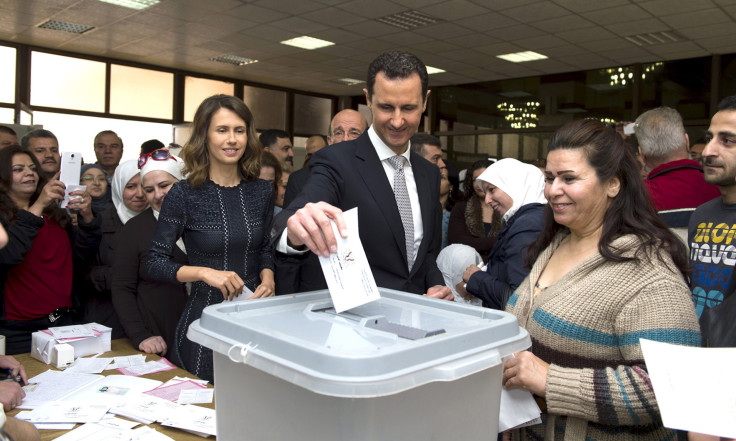Syria Elections 2016: Assad Casts Vote In Parliamentary Elections Despite Widespread Criticism

Syria's President Bashar Assad voted in parliamentary elections being held in government-controlled parts of the country Wednesday amid widespread criticism by opposition groups. The elections fell on the same day peace talks over the ongoing conflict in Syria restarted in Geneva.
Assad and his wife Asma cast their ballots at the Assad Library in Damascus. The parliamentary elections, which were announced by Assad earlier this year, reportedly came as the United Nations envoy for Syria, Staffan de Mistura, aimed to renew "proximity talks" among opposition groups and regime representatives over political transition.
Many believe that Wednesday's voting, where some 3,500 candidates are competing for the 250 parliamentary seats after more than 7,000 others dropped out, is a sham to help Assad and his Baath Party gain legitimacy. Opposition groups have urged Assad to step down, calling for a transitional body with full executive powers. However, the regime and its allies, mainly Russia and Iran, argue that Syrian people should decide Assad's fate and the government's focus should be on fighting terrorism.
Damascus says that the voting is constitutional and has nothing to do with the peace talks in Geneva aimed at ending the civil war, which has been ongoing for five years and has so far displaced more than half of Syria's population, according to the Associated Press (AP).
Munther Khaddam, a member of the National Coordination Body (NCB), reportedly said that his group will boycott the elections "because it comes in the abnormal context and runs against the political track of the Geneva talks."
Popular Front for Change and Liberation, another opposition group, also said that it will boycott the elections.
"The elections at this very time send very negative messages, especially that the talks in Geneva are now focused on forming a new government, so why making parliament elections that could be repeated soon after the formation of a new government," Arafat, a member of the group, reportedly said.
Syria held its first presidential election nearly two years ago, in which Assad won a landslide victory, with nearly 90 percent of the votes. The vote — touted by the leader as proof of support for his presidency — was widely seen as an indication that Assad had little intention of leaving power anytime soon.
As of last year, the government had lost control of about 83 percent of the country, according to an IHS Jane Intelligence Review. Assad’s forces have recently seen some gains, particularly against the Islamic State group as they have recaptured some locations, including the ancient city of Palmyra.
© Copyright IBTimes 2025. All rights reserved.





















